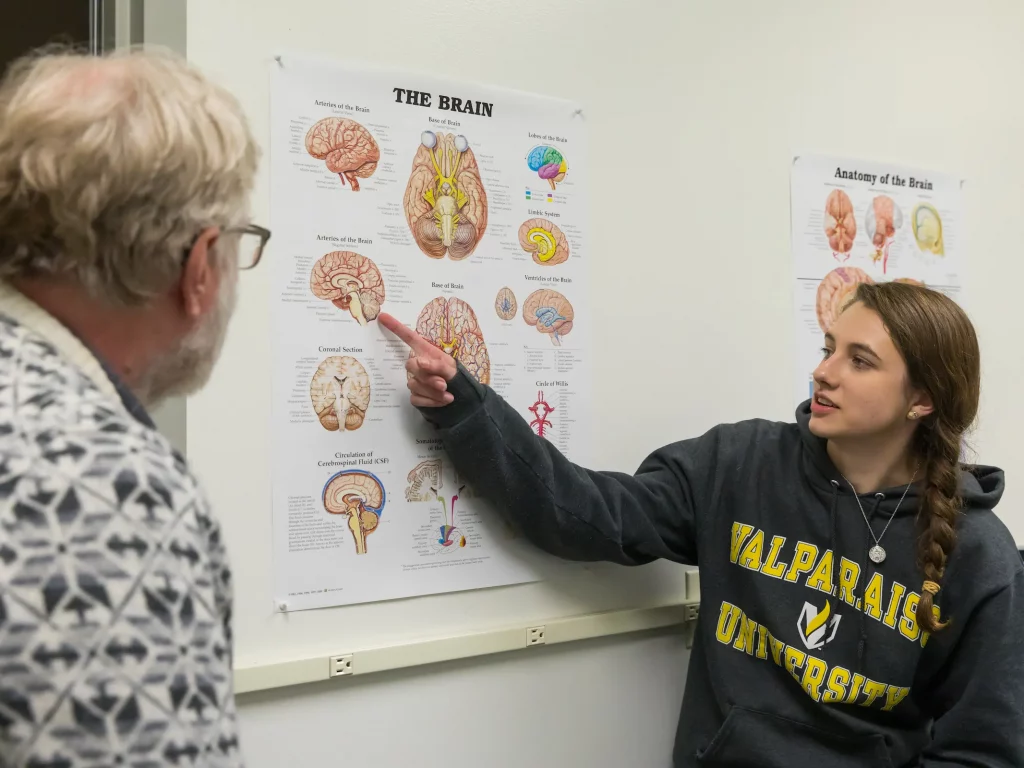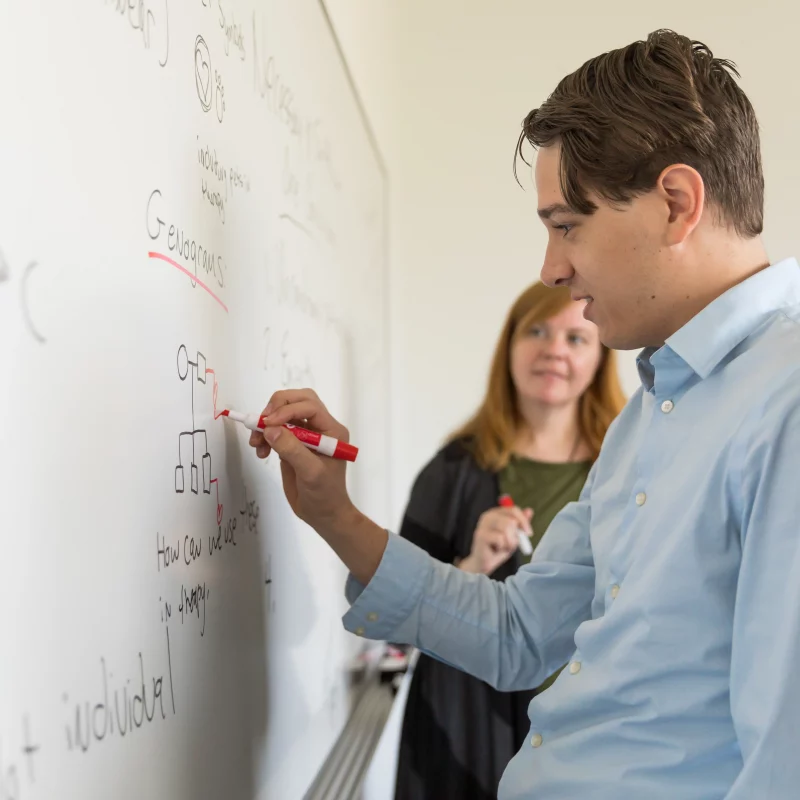Undergraduate Majors and Minors

Why Psychology at Valpo?
At Valpo, the science of psychology extends far beyond the classroom. Our program takes a deep dive into the complexities of the mind, behavior, and the human experience. With a strong foundation in real-world applications, this major prepares students to expand their horizons, inspire the best in others, and dutifully lend their light to entire communities.
Our students discover their calling through dynamic lab courses, guided research, fieldwork, and service learning led by dedicated faculty mentors. Course topics and instructor expertise include child development, cognition, conservation psychology, forensic psychology, health psychology, psychotherapy, and so much more – allowing students to explore their specific interests in a diverse field.
Psychological Sciences and Counseling
Highlights
100%
of Valpo psychology students engage in experiential learning opportunities, including student-faculty research, internships, and signature programs like the Inside Out Prison Exchange.
Intensive Lab Courses
Our program is set apart through hands-on, methodical learning. Along with off-campus fieldwork, all Valpo psychology students engage in several lab courses in animal learning, cognition, conservation psychology, and physiological psychology.
Personal Faculty Advisor
Each psychology student is assigned a dedicated faculty advisor within the Department of Psychological Sciences and Counseling, who provides personalized guidance and professional development that is designed to steer academic coursework into a future career.
Psychology Major Requirements
Valpo’s psychology program is grounded in our universal liberal arts core. Starting year one with the Valparaiso University Experience (VUE), students expand their major of study through critical thinking, cultural awareness, and empathy – each of which are hallmark Valpo values. Through these foundational studies, psychology majors master the teamwork and communication skills that are essential to employers and graduate programs alike.
First-year, transfer, and continuing education students alike can expect to jump into methodological training, research opportunities, and lab courses. Before graduation, Valpo psychology students are training animals, utilizing electroencephalogram (EEG) equipment, programming experiments, and lending their light in our greater community.
Valpo uniquely offers both a bachelor of arts and a bachelor of science in psychology, allowing students to tailor their education toward their complementary interests and professional aspirations.
| Bachelor of Arts and Bachelor of Science in Psychology | ||
|---|---|---|
| Major Requirements: Minimum 27 Credits | ||
| Required Courses: | ||
| PSY 110 | General Psychology | 3 Cr. |
| PSY 111 | Laboratory in General Experimental, Psychology | 1 Cr. |
| PSY 201 | Statistical Methods | 3 Cr. |
| PSY 202 | Research Methods in Psychology | 3 Cr. |
| PSY 205 | Professional Development in Psychology | 1 Cr. |
| PSY 493 | Senior Assessment | 0 Cr. |
| Psychology Content Area Courses: 12 Credits | ||
| Take Four Courses from the Following Options: | ||
| PSY 215 | Life Span Development | 3 Cr. |
| PSY 225 | Social Psychology | 3 Cr. |
| PSY 235 | Abnormal Psychology | 3 Cr. |
| PSY 245 | Physiological Psychology | 3 Cr. * |
| PSY 250 | Principles and Applications of Learning | 3 Cr. * |
| PSY 350 | Human Cognition | 3 Cr. * |
| Psychology Lab Courses: 2–8 Credits | ||
| Take Two Psychology Courses with Labs at the 200 Level or Higher: | ||
| PSY 245 | Physiological Psychology | 3 Cr. |
| PSY 246 | Laboratory in Physiological Psychology | 1 Cr. |
| PSY 250 | Principles and Applications of Learning | 3 Cr. |
| PSY 251 | Laboratory in Principles and Applications of Learning | 1 Cr. |
| PSY 310 | Conservation Psychology | 3 Cr. |
| PSY 311 | Laboratory in Conservation Psychology | 1 Cr. |
| PSY 320 | Cognitive Development | 3 Cr. |
| PSY 321 | Laboratory in Cognitive Development | 1 Cr. |
| PSY 350 | Human Cognition | 3 Cr. |
| PSY 351 | Laboratory in Human Cognition | 1 Cr. |
| PSY 375 | Human Neuropsychology | 3 Cr. |
| PSY 376 | Laboratory in Human Neuropsychology | 1 Cr. |
Both degree pathways consist of either 27 or 40 psychology-focused credit hours. Students pursuing either degree who are looking ahead to graduate school are advised to enroll in our 40-credit hour psychology pathway. This pathway provides rigorous training and provides a solid background in primary areas of the discipline. While no additional majors or minors are required, many students utilize a second major or minor to explore related passions and expand their expertise.
Psychology Career Outcomes
According to the U.S. Bureau of Labor Statistics, the job outlook for psychologists is expected to grow by 7% through 2033 – faster than the average. Meeting high demand, our Beacons go on to shine as caring leaders at impactful institutions across the country – including DuPage Pads, the Federal Bureau of Investigation (FBI), and Sprout Social. Some have illuminated roles in Northwest Indiana at Porter-Starke Services, Pillars of Wellness, and right here at their alma mater.
Career Pathways with a Psychology Degree:
- Academic advisor
- Applied behavioral analyst
- Case manager
- Criminal investigator
- Data analyst
- Human resources manager
- Marketing professional
- Research assistant
- Technical writer
Career Pathways with a Graduate-Level Degree:
- Counselor
- Medical professional
- Physical therapist
- Psychologist
- Psychiatrist
- Researcher
Over half of Valpo psychology graduates go on to earn advanced degrees, enrolling in master’s and doctoral programs in clinical psychology, counseling, or experimental psychology. Our alumni have continued their studies at institutions like Colorado State University, Purdue University, the University of Minnesota, and the University of Pittsburgh. Students can also continue their education here at Valpo with our accredited and cost-effective early entry master of arts in clinical mental health counseling program.

Student Success
– Lijana Teague ’23

